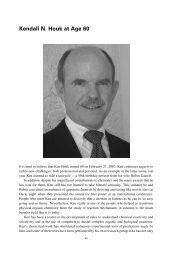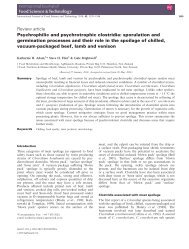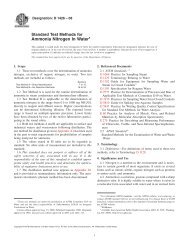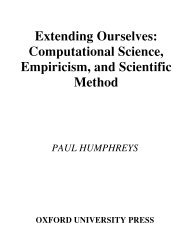Bad Astronomy: Misconceptions and Misuses Revealed, from ...
Bad Astronomy: Misconceptions and Misuses Revealed, from ...
Bad Astronomy: Misconceptions and Misuses Revealed, from ...
Create successful ePaper yourself
Turn your PDF publications into a flip-book with our unique Google optimized e-Paper software.
SHADOWS IN THE SKY 117<br />
Moon’s orbital motion sweeps it around the Earth, more <strong>and</strong> more<br />
of the Sun disappears behind the Moon’s limb. We see the Moon<br />
in silhouette, a dark circle slowly covering the Sun. Eventually, the<br />
entire disk of the Sun is blocked. When this happens, the sky<br />
grows deep blue, almost purple, like at sunset. The temperature<br />
drops, birds stop singing, crickets will chirp, <strong>and</strong> it’s like having a<br />
little night in the middle of the day.<br />
This would be odd enough, but at the moment of totality, when<br />
the Sun’s disk is completely covered by the Moon, the Sun’s outer<br />
atmosphere, called the corona, leaps into view. Normally invisible<br />
because the Sun’s surface is vastly brighter, the corona is wispy, ethereal,<br />
<strong>and</strong> surrounds the Sun like a halo or aura. When the corona<br />
becomes visible, viewers almost universally gasp in awe <strong>and</strong> delight,<br />
<strong>and</strong> some have been brought to tears by the sheer beauty of it.<br />
Eclipses are magnificent, <strong>and</strong> they do not happen very often, but<br />
they are predictable. The Moon’s path in the sky has been charted<br />
for millennia, <strong>and</strong> ancient astronomers could predict eclipses with<br />
perhaps surprising accuracy. It’s not surprising then that historical<br />
records are full of tales about eclipses. Mark Twain even used one<br />
in his novel A Connecticut Yankee in King Arthur’s Court. In it a<br />
young man <strong>from</strong> America is transported back in time to medieval<br />
Engl<strong>and</strong> <strong>and</strong>, through a variety of circumstances, ends up being<br />
sentenced to be burned at the stake. However, he happens to know<br />
that a total solar eclipse is about to occur <strong>and</strong> tells his captors that<br />
if they don’t release him, he’ll take away the Sun. Of course, the<br />
eclipse happens right on schedule <strong>and</strong> he is set free.<br />
That may sound silly, but it’s based on an actual event, <strong>and</strong><br />
none other than Christopher Columbus is in the leading role. In<br />
1503, on his fourth voyage to America, Columbus was str<strong>and</strong>ed in<br />
Jamaica, his ships too damaged to be seaworthy. He relied on the<br />
natives for food <strong>and</strong> shelter, but they soon became weary of feeding<br />
Columbus’s men. When the natives told him this, Columbus<br />
remembered that a lunar eclipse—when the Earth’s shadow falls<br />
on the Moon, turning it dark—would occur soon. Just as Twain<br />
retold the tale nearly 400 years later (with a solar instead of a lunar<br />
eclipse), the event terrified the natives, who then begged Columbus
















